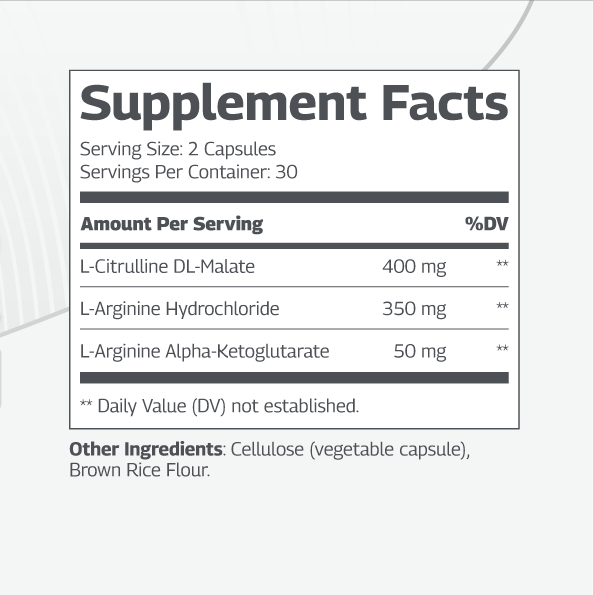
L-Citrulline DL-Malate
L-Citrulline DL-Malate, commonly known as Citrulline Malate, is a dietary supplement that has gained popularity among athletes, bodybuilders, and fitness enthusiasts. It is a compound formed by combining L-Citrulline, a non-essential amino acid, with Malic Acid, a naturally occurring substance found in fruits.
One of the primary benefits of L-Citrulline DL-Malate is its role in enhancing nitric oxide (NO) production in the body. Nitric oxide is a vasodilator, meaning it relaxes and widens blood vessels, allowing for improved blood flow. This increased blood flow can be particularly advantageous during exercise, as it enhances the delivery of oxygen and nutrients to working muscles. As a result, athletes may experience improved endurance, reduced fatigue, and potentially better overall performance.
Another notable advantage of Citrulline Malate is its potential to reduce muscle soreness and promote post-exercise recovery. Studies have suggested that supplementing with Citrulline Malate may help decrease the perception of muscle fatigue and support a faster recovery process, allowing individuals to train more frequently and intensely.
Furthermore, Citrulline Malate has been linked to benefits beyond the realm of exercise. Some research suggests that it may support cardiovascular health by promoting healthy blood pressure levels and supporting the endothelial function of blood vessels.
L-Arginine Hydrochloride
L-Arginine Hydrochloride, often referred to simply as Arginine HCl, is a naturally occurring amino acid that plays a crucial role in various physiological processes within the human body. As an amino acid, it serves as one of the building blocks of proteins, contributing to the synthesis of enzymes, hormones, and other essential molecules.
One of the key functions of L-Arginine Hydrochloride is its involvement in the production of nitric oxide (NO). Similar to Citrulline Malate, L-Arginine HCl acts as a precursor to nitric oxide, which is a potent vasodilator. By promoting the relaxation and dilation of blood vessels, nitric oxide helps improve blood flow throughout the body. This enhanced circulation can have several benefits, including better delivery of oxygen and nutrients to muscles during physical activity, leading to increased endurance and reduced fatigue.
Due to its potential role in enhancing blood flow, L-Arginine Hydrochloride has garnered attention in the fitness and sports nutrition industries. Athletes and bodybuilders often use Arginine supplements to support their workouts and promote muscle development. Additionally, improved blood flow can also have positive effects on sexual health, as it may aid in erectile function by increasing blood flow to the genital region.
Aside from its effects on blood flow, L-Arginine Hydrochloride is involved in various other physiological processes. It contributes to the synthesis of creatine, which is essential for energy production in muscles, and it is also involved in immune system regulation, wound healing, and hormone secretion.
L-Arginine Alpha-Ketoglutarate (AAKG)
L-Arginine Alpha-Ketoglutarate (AAKG) is a popular dietary supplement that combines the amino acid L-Arginine with Alpha-Ketoglutarate (AKG), a compound that plays a role in the Krebs cycle, also known as the citric acid cycle, which is a critical metabolic pathway for energy production in the body.
The primary reason for combining L-Arginine with Alpha-Ketoglutarate is to enhance the potential benefits of L-Arginine. Like other forms of Arginine, AAKG is a precursor to nitric oxide (NO) production. Nitric oxide is a powerful vasodilator that relaxes and widens blood vessels, promoting increased blood flow to muscles and organs. As a result, athletes and bodybuilders often use AAKG to support their exercise performance, as improved blood flow can lead to better oxygen and nutrient delivery to working muscles, potentially increasing endurance and reducing muscle fatigue during workouts.
Additionally, AAKG has been linked to the promotion of protein synthesis, which is crucial for muscle repair and growth. By aiding in the synthesis of proteins, AAKG may help enhance muscle recovery after intense exercise and contribute to muscle-building processes.
Beyond its potential benefits for athletes, L-Arginine Alpha-Ketoglutarate is also sometimes used for its role in supporting overall cardiovascular health. The improved blood flow associated with increased nitric oxide production may help maintain healthy blood pressure levels and support the health of the endothelium, the inner lining of blood vessels.
